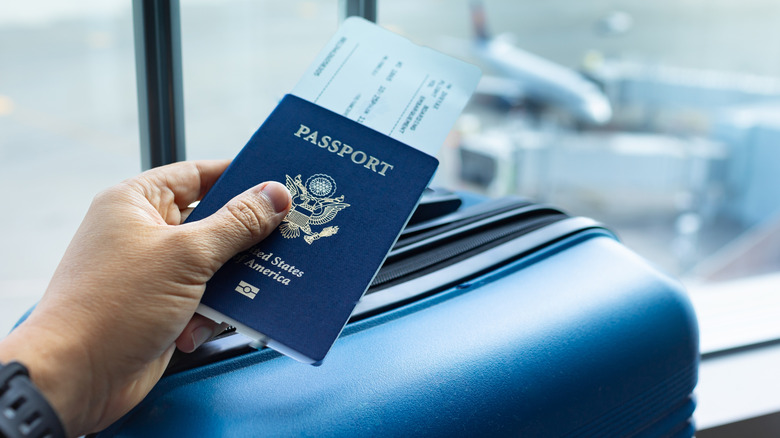This Type Of Travel Program Offering Free Accommodations Could Be Your Ticket To The Most Affordable Vacation
Picture this: You're sitting at home, mindlessly scrolling through your socials, when you see new posts from that one friend who never seems to have a stable job. Yet their Instagram grid is nevertheless sprayed with such a voluminous amount of travel content that any aspiring jetsetter would be green with envy. There they are, strolling down the palm-lined sandy beaches of Goa, India; trekking along the blue-tinged Perito Moreno, one of the world's most famous glaciers in Argentina; lounging in a crystal-clear pool with a coconut in Thailand; and exploring castles and palaces galore in England. And as you scroll, trying to hold back those feelings of jealousy, you just have one question: How can they afford it? It's no secret that travel is pricey, especially as flights keep getting more and more expensive. And once you're at your destination, hotels and meals can eat up the brunt of your budget. But there's a way to make a vacation more affordable than you'd think — work and travel programs.
Currently, there are a plethora of these programs offering free accommodations (and sometimes even meals) for a few hours per week of volunteer work. You might need to socialize with guests at a backpackers' hostel in Sweden, provide photography services for a biodiversity project in an Ecuadorian cloud forest, or help a traditional winemaker in Georgia. Conditions will vary significantly depending on the program you choose, the location, and other factors. But typically, you'll stay where you work and will provide four to five hours of labor per day, five days per week. So, if your shift is 9 a.m. to 2 p.m., that still gives you the whole afternoon and evening to explore your chosen location — and you'll have a comfy place to rest your head at the end of the day.
Popular work and travel programs
You have numerous options to choose from when it comes to these programs, but three of the most commonly used platforms are WWOOF, Workaway, and Worldpackers. Launched in 1971 (yes, before the internet!), WWOOF is the oldest of these exchange programs. Its name stands for Worldwide Opportunities on Organic Farms and, as the name suggests, the organization connects volunteers with farmers. WWOOFers receive accommodations and meals, while hosts gain assistance in animal care, planting, harvesting, and more. You could be living on a family farm in Romania while riding horses in the Carpathian Mountains, or helping with coconut oil production on a hacienda in the Peruvian Andes. WWOOF currently operates in over 130 countries.
Workaway and Worldpackers, conversely, offer an extensive array of volunteer opportunities in over 170 countries and 140 countries, respectively. These include English-teaching, non-profit work, renovations or housekeeping, and permaculture projects. Accommodations differ widely and can range from cozy homestays and farms to hostels and rustic eco-lodges. While there are pros and cons to both of these programs, according to Reddit and other forums, some main differences are that Workaway is more established (founded in 2002) and has more hosts, whereas Worldpackers has a cheaper membership fee and focuses more on security, with stronger verification of hosts. It also offers support for first-time travelers through its online academy. Both provide learning and skill-sharing opportunities and ways to connect with other travelers.
Wherever you go, make efforts to connect with the local culture, and note that not every host will speak English fluently. Additionally, choose your location with intention — for example, if you'd like to learn Portuguese, look for roles in Brazil or Portugal. If it's been a lifelong dream of yours to salsa like a pro, then base yourself somewhere in Latin America, like Medellín, South America's "City of Eternal Spring."
Things to consider before you work and travel
Before you begin your new life gallivanting around the globe, there are several things to consider. Remember that you're there to volunteer, first and foremost: Most hosts and businesses in these programs require 20 to 30 hours per week of consistent work. So view this program as you would any other job — take it seriously and be professional. Arriving to work extremely late or doing tasks at 50% because you partied the night before and are hungover is unacceptable. As well, think about your personality, interests, and skills before applying for positions. Yes, many of these roles have a quick turnover, and they might be fairly easy to acquire. But if you're an introvert who dislikes speaking to strangers, then a front-desk position at a busy hostel is probably not a good fit. And if you're a city mouse with no experience doing manual labor, then WWOOFing may be more challenging than you expect. This isn't to say that you shouldn't push yourself out of your comfort zone — just know what you're getting into before you take the leap.
Finally, research the visa requirements in your host country. While in many places, you can still do short-term, informal volunteer work on a tourist visa, this isn't the case everywhere. And if you're being paid (even a small sum), you may need a work permit. You don't want to end up in prison in a foreign country or deported because you decided it would be fine to bartend under the table on a tourist visa. All in all, work and travel programs offer participants an incredible opportunity to globetrot for an extended period of time, immerse themselves in new cultures, and possibly make life-long connections — all on a shoestring budget.


